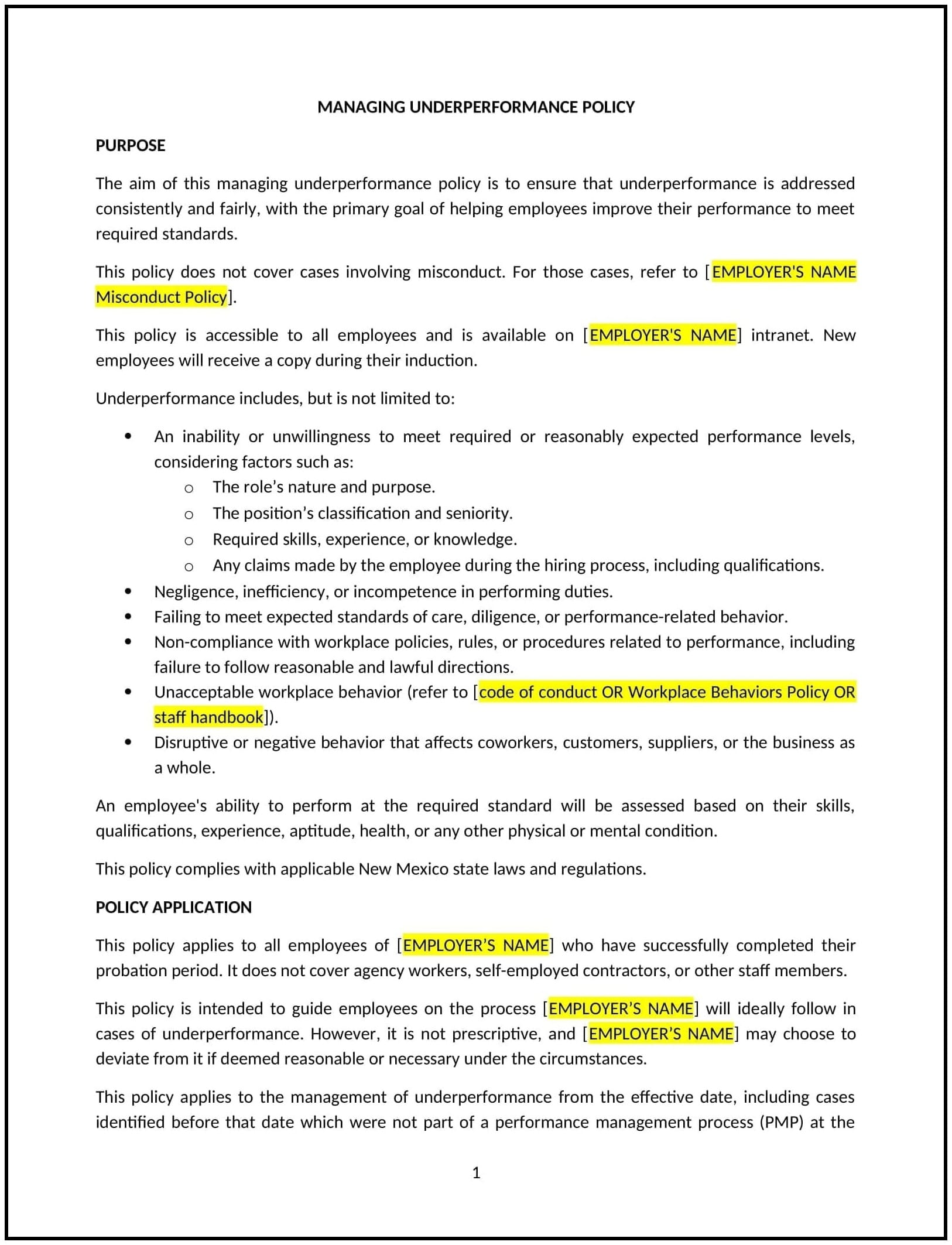Managing underperformance policy (New Mexico): Free template
Got contracts to review? While you're here for policies, let Cobrief make contract review effortless—start your free review now.

Customize this template for free
Managing underperformance policy (New Mexico)
This managing underperformance policy is designed to help New Mexico businesses address and improve employee performance issues in a fair, consistent, and constructive manner. The policy outlines how to identify underperformance, provide feedback and support, and take appropriate steps to address and rectify performance issues while maintaining a positive and respectful work environment.
By adopting this policy, New Mexico businesses can ensure that performance issues are addressed proactively, that employees have the opportunity to improve, and that the business is able to maintain high standards of productivity and morale.
How to use this managing underperformance policy (New Mexico)
- Define underperformance: Clearly define what constitutes underperformance in the context of the business, including specific performance metrics, such as productivity, quality of work, or meeting deadlines.
- Set expectations for employees: Communicate clear performance expectations to employees and ensure they understand what is required to meet the standards of their role. This could include measurable goals, performance reviews, and regular feedback.
- Implement a performance improvement plan (PIP): Outline the process for creating a performance improvement plan when underperformance is identified. A PIP should include specific, measurable objectives, support mechanisms, timelines, and regular follow-ups.
- Provide feedback and support: Provide constructive feedback to employees about areas for improvement and offer support to help them meet performance expectations, such as additional training, mentorship, or adjusted workloads.
- Reflect New Mexico-specific considerations: Address any New Mexico-specific labor laws or employee protections regarding performance management, including any requirements for documenting performance issues and conducting disciplinary actions.
Benefits of using this managing underperformance policy (New Mexico)
Implementing this policy provides New Mexico businesses with several advantages:
- Improves employee performance: A clear process for addressing underperformance helps employees understand how they can improve and provides the necessary support to help them succeed.
- Maintains fairness and consistency: A standardized approach to managing underperformance ensures that all employees are treated equally and that performance issues are addressed consistently, reducing the risk of bias or favoritism.
- Protects the business from legal risks: By following a structured process for managing underperformance, businesses reduce the risk of legal challenges related to unfair treatment or wrongful termination claims.
- Increases employee engagement: Offering support to underperforming employees shows that the company is invested in their success, which can improve morale and engagement in the workplace.
- Fosters a positive work culture: A proactive approach to managing underperformance helps address issues early on, maintaining a positive and collaborative work environment where employees feel supported and motivated to improve.
Tips for using this managing underperformance policy (New Mexico)
- Communicate the policy clearly: Ensure all employees are aware of the expectations and the process for addressing performance issues. The policy should be included in the employee handbook and reviewed regularly during performance discussions.
- Monitor progress: Regularly monitor and assess employee progress toward the goals outlined in the performance improvement plan, providing ongoing feedback and adjustments as needed.
- Offer training and development opportunities: Provide resources and opportunities for employees to improve their skills and knowledge, which can help resolve performance issues and prevent recurrence.
- Document performance issues: Keep accurate and detailed records of all performance discussions, feedback, and actions taken to address underperformance. Documentation will be important for both performance tracking and legal protection.
- Be proactive: Address performance issues as soon as they arise rather than waiting until they become significant problems. Early intervention can often prevent more serious issues down the line.